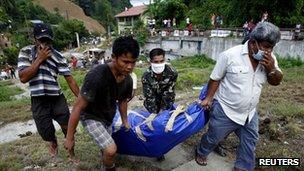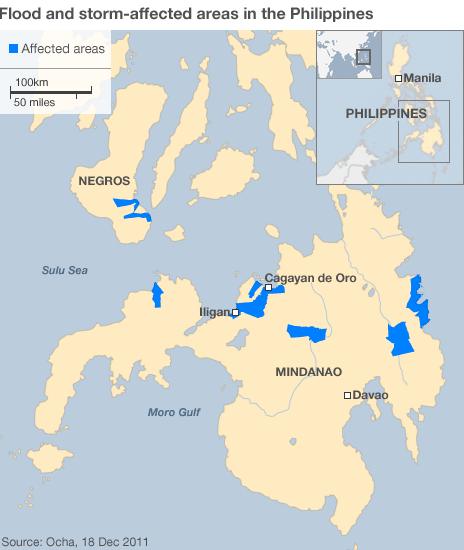Philippines floods: Aid agencies say 120,000 in need
- Published
Unicef's Angela Travis says water supplies and sanitation are key concerns
Aid agencies in the Philippines are trying to reach more than 120,000 people affected by flash flooding on the island of Mindanao.
Coastal communities were devastated early on Saturday in flash floods triggered by a tropical storm.
Officials in two cities said mass burials were being organised as bodies were rapidly decomposing in the heat.
At least 972 people died in the disaster, according to goverment sources.
"We lost count for those still missing," disaster managment chief Benito Ramos said in a short statement.
Disaster agencies are attempting to provide food, water, medicine and body bags, but damaged roads are hampering efforts to reach survivors in remote villages.
The authorities on Mindanao have been criticised for their handling of the disaster, the BBC's Kate McGeown reports from Cagayan de Oro, one of the worst-hit areas.

Officials are considering burying bodies in mass graves
Other parts of the country have detailed plans of what to do if a strong storm or typhoon happens, but it seems that many officials on Mindanao were caught unprepared, she adds.
About 40,000 people on Mindanao are living in evacuation centres after losing their homes and possessions.
China and the US are among international donors offering assistance.
Mr Ramos said funeral parlours had been overwhelmed by the catastrophe.
Speaking from a boat off Cagayan de Oro, he told AFP news agency: "I'm out here retrieving bodies that are starting to rise to the surface."
Corpses unclaimed
Officials in Cagayan de Oro said corpses were piling up unclaimed at mortuaries and overworked staff had run out of coffins.
One establishment turned away the bodies of two drowned children, local media reported.
The ports of Iligan and nearby Cagayan de Oro bore the brunt of the flooding.
Two concrete communal tombs were being constructed in Iligan, said Teresita Badiang, an engineer at the Iligan mayor's office.
The bodies would be placed side by side "so that their burial will be dignified", she added.
Strict guidelines would have to be followed for mass burials, including photographing corpses and listing identifying marks, said Philippine Red Cross chief Gwendolyn Pang.
"I'm sure their families will look for them," she said.
The flash floods struck in the early hours of Saturday as a passing tropical storm coincided with high tides.
As rivers burst their banks, many were trapped in their homes while in other areas entire villages are reported to have been swept away.
Although the Philippines is struck by several typhoons and tropical storms every year, the south of the country usually escapes the worst damage.

- Published19 December 2011
- Published17 December 2011